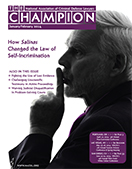January/February 2014

How must defense attorneys advise clients in the wake of Salinas v. Texas? How can counsel combat the government's use of lost evidence? Find out in this issue of The Champion.
Articles in this Issue
-
A Call to End Prospective Waivers of Judicial Disqualification in Accountability Courts
The ABA Model Code of Judicial Conduct (CJC), Rule 2.11: Disqualification, provides: “A judge shall disqualify himself or herself in any proceeding in which the judge’s impartiality might reasonably be questioned. …”1
-
Affiliate News
Affiliate News Gerald Lippert Affiliate News January/February 2014 14 www.nacdl.org/affiliates 2014 NACDL & Affiliate CLE Calendar March 5-8 NACDL’s Midwinter Meeting & Seminar ‘Preventing & Mitigating the Domino Effect of Criminal Convictions’, InterContinental Hotel
-
Book Review: Manifest Injustice: The True Story of a Convicted Murderer and the Lawyers Who Fought f
Manifest Injustice is energetic, engaging, and emotional. The true tale of a murder mystery spanning half a century, it contrasts shoddy police work with energetic investigation by law students. It is a tale featuring hope and despair, and is an incredible saga for 21st century, scientifically savvy America.
-
Capital Punishment in America: A Steady Decline — But Still a Long Way to Go (Inside NACDL)
Capital punishment is on the wane. Executions and the number of states that permit capital punishment both declined in 2012. Moreover, the ABA Death Penalty Due Process Review Project identified 12 distinct flaws that are prevalent in jurisdictions that still allow capital punishment. These flaws create an unacceptably high risk of injustice and inadequate safeguards to minimize the potential that innocent people will be executed.
-
From the President: Bending Toward Justice
While we have started to deliver justice to the immense racial inequality that Dr. Martin Luther Ling worked to address, the presence of racial inequality in the criminal justice system remains both rife and intolerable. NACDL has raised awareness of the problem while simultaneously providing activists and policy makers with the type of concrete proposals necessary to effect desirable change.
-
Getting Scholarship Into Court Project
The "Getting Scholarship Into Court Project" brings helpful law review articles and other writings to the attention of criminal defense attorneys.
-
Intellectual Disability: A Digest of Complex Concepts in Atkins Proceedings
In 2002 the U.S. Supreme Court issued its opinion in Atkins v. Virginia,1 which categorically banned the death penalty for defendants who have intellectual disability.2 Since the Supreme Court’s ruling in Atkins, hundreds of capital defendants’ cases have come before state and federal courts for factual determination of the presence of this disability. A review of these cases demonstrates that courts, attorneys, law enforcement, and forensic experts have limited understanding of the scientific fundamentals of a diagnosis of intellectual disability.
-
NACDL News: Champion Special Issue on Brady Wins Prestigious Award
The May 2013 issue of The Champion magazine — Perspectives on Brady at 50 — was named the winner of min’s 2013 Editorial & Design Award in the category of Print/Online Coverage of a Single Topic.
-
NACDL News: Court Dismisses NACDL Lawsuit Challenging Border Searches
On Dec. 31, 2013, U.S. District Court Judge Edward Korman dismissed Abidor v. Napolitano, more than two years after oral argument on the government’s Motion to Dismiss the case.
-
NACDL News: Court Finds Systemic Violation of Indigent Defendants’ Right to Counsel
On Dec. 5, 2013, in the case of Wilbur v. City of Mount Vernon, et al., one of a number of cases challenging systemic deficiencies in the delivery of indigent defense services across the nation, the U.S. District Court for the Western District of Washington found systemic violations of defendants’ Sixth Amendment right to counsel by the cities of Mount Vernon and Burlington, Washington, and ordered injunctive relief.
-
NACDL News: President Obama Surprises With Rare Exercise of Clemency Power
The White House announced on Dec. 19, 2013, that President Barack Obama granted clemency to 21 individuals — eight commutations and 13 pardons.
-
NACDL News: Racial Disparities Conference
On Dec. 6, 2013, NACDL, along with the Foundation for Criminal Justice, the Brennan Center for Justice, the Association of Prosecuting Attorneys, the Center for NuLeadership on Urban Solutions, and the New York County Lawyers’ Association, hosted an all-day convening entitled Criminal Justice in the 21st Century: Eliminating Racial and Ethnic Disparities in the Criminal Justice System – Advancing the Reform Dialogue Through Action.
-
Silence Is No Longer Golden: How Lawyers Must Now Advise Suspects in Light of Salinas v. Texas
Almost 70 years ago, Justice Robert Jackson made the following observation in Watts v. Indiana: “[A]ny lawyer worth his salt will tell the suspect in no uncertain terms to make no statement to police under any circumstances.”1 But after the Supreme Court’s recent decision in Salinas v. Texas,2 Justice Jackson’s once-stalwart advice could be tantamount to malpractice if police question a suspect in a noncustodial context. Silence is no longer golden.
-
The Government’s Use of Lost Evidence
Imagine an individual is accused of a horrific crime. The prosecution claims that it has a voluminous amount of evidence against the defendant. It parades experts before the jury to testify how this evidence links the defendant to the crime — and yet all of this evidence has been lost. Some of this lost evidence could possibly exonerate the accused. The defendant is not, however, given the opportunity to examine or test the volumes of evidence presented at trial that supposedly establish guilt beyond a reasonable doubt. Instead, the defendant is left to challenge this evidence through cross-examination and based on pictures of the real evidence. Surely this sort of scenario cannot satisfy the promise of due process of law contained in the U.S. Constitution. Yet astonishingly, according to some courts, it does.
